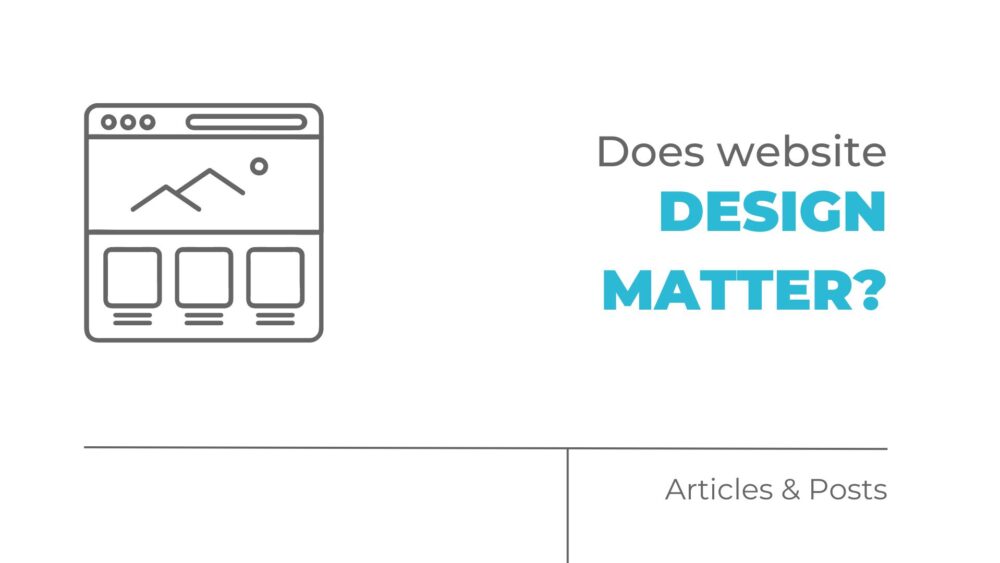Does website design matter?
Absolutely.
It creates first impressions, heightens user experience, builds credibility, boosts SEO, and reinforces brand identity.
A well-designed site not only attracts and retains visitors but also gets more conversions and sets you apart from competitors, making it essential for any successful online presence.
In this guide, we’ll explore how good web design impacts user experience, the key elements of effective web design, and its influence on SEO.
By the end, you’ll see why investing in web design services is essential.
How Does Good Web Design Affect User Experience?
Good web design is the foundation of a positive user experience.
When users land on your site, they form an opinion within seconds.
A well-designed website makes a great first impression and keeps visitors engaged.
Here’s how:
Ease of Navigation
Clear and intuitive navigation helps users find what they’re looking for quickly.
This reduces frustration and encourages them to explore more pages.
Visual Appeal
An aesthetically pleasing design grabs attention and makes your site memorable.
It reflects your brand’s professionalism and builds trust with your audience.
Responsive Design
A responsive design verifys your site looks great on all devices, from desktops to smartphones.
This improves accessibility and user satisfaction.
Fast Load Times
Nobody likes waiting for a page to load.
Optimizing your site for speed keeps users from bouncing off and gives them a better overall experience.
By focusing on these aspects, you can significantly improve user experience, making your site a pleasure to visit.
What Are the Key Elements of Effective Web Design?
Effective web design is about functionality and user engagement.
Here are the key elements you should focus on:
Clear Call-to-Actions (CTAs)
Your CTAs should be easy to spot and encourage users to take action, whether it’s signing up for a newsletter, making a purchase, or contacting you for more information.
Consistent Branding
Use consistent colors, fonts, and imagery to create a cohesive brand identity.
This helps users recognize and remember your brand.
Quality Content
Well-written, informative content keeps users engaged and encourages them to stay longer on your site.
Make sure your content answers their questions and provides value.
SEO Optimization
Incorporate SEO best practices to confirm your site ranks well on search engines.
This includes using relevant keywords, optimizing meta tags, and writing content that is easy for your audience to read.
User-Friendly Layout
Organize your content in a way that’s easy to follow.
Use headings, bullet points, and plenty of white space to make your site readable and engaging.
Including these elements in your web design will help create a site that’s not only visually appealing but also highly functional and user-friendly.
How Does Web Design Impact SEO?
Web design plays a critical role in SEO.
A well-designed website can improve your search engine rankings and drive more organic traffic.
Here’s how:
Mobile-Friendliness
Search engines like Google prioritize mobile-friendly sites.
A responsive design helps your site perform well on mobile devices, boosting your SEO.
Page Load Speed
Fast-loading sites are favored by search engines.
Optimizing images, leveraging browser caching, and using a reliable hosting service can improve your load times and SEO.
Structured Data
Using structured data helps search engines understand your content better.
This can improve your search visibility and result in rich snippets, which attract more clicks.
Content Organization
A well-organized site with clear headings and subheadings makes it easier for search engines to crawl and index your pages.
This raises your chances of ranking higher in search results.
User Engagement
High-quality, engaging content reduces bounce rates and increases time spent on your site.
These factors signal to search engines that your site provides value, which can improve your rankings.
By paying attention to these aspects of web design, you can create a site that not only looks great but also performs well in search engine rankings.
At the End of the Day
A well-designed website increases user experience, warrants effective functionality, and boosts SEO, making it an essential investment for any business.
Whether you’re working with a budget web or looking to build a website in a day, focusing on key design elements will help you create a professional and successful online presence.
Ready to improve your website design?
With these tips, you’re well on your way to creating a site that looks great, functions smoothly, and ranks well.
Happy designing!


Comments are closed.